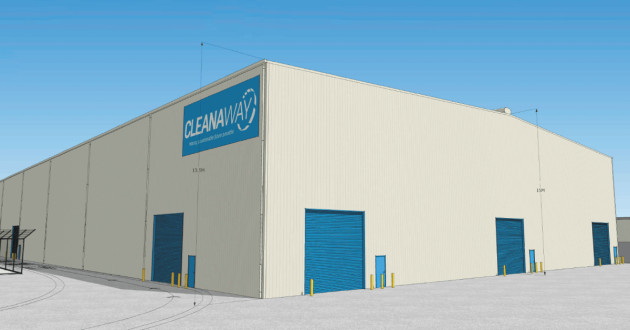Pact Group and Cleanaway have invested $38 million into a new plastic recycling facility at Laverton, Victoria, which will become Australia’s largest post-consumer polyethylene recycling plant.
The plant will convert locally collected kerbside plastic materials into high quality food grade rHDPE and rPP resins. This will facilitate the inclusion of locally processed recycled resin into food, dairy and other packaging, enabling brand owners and retailers to deliver on their sustainability objectives.
Cleanaway will provide the recycled plastic through its collection and sorting network, and Pact will provide technical knowledge, operate the plant, and buy recycled plastic resin from the facility to use in its packaging, with the balance sold to third parties.
The new facility will process more than 20,000 tonnes of plastic waste per year, or the equivalent of over 500 000K plastic milk bottles and food tubs collected from household recycling bins.
Sanjay Dayal, Pact’s managing director and CEO, says the new facility highlights the progress the company has made in expanding its reuse and recycling capabilities.
“At Pact, we are committed to leading the way in creating a strong, local circular economy that diverts waste materials from landfill and uses them to deliver sustainably manufactured products, including recycled packaging solutions that are increasingly in demand,” Dayal continues.
“With this is mind, we are delighted to be able to lead the development of this new industry in Australia, which will also create thousands of new jobs and support the national manufacturing industry.”
For Brendan Gill, Cleanaway’s CEO, the opportunities presented by the circular economy are endless.
“This 20,000-tonne plastic pelletising facility is a huge win for the environment by creating a high value, recycled raw material from plastics we collect and sort through our network,” explains Gill.
“This venture makes it possible to turn a milk bottle back into a milk bottle. This will provide our Melbourne councils and commercial customers with a great outcome for their recycling initiatives and contributes to the development of a domestic circular economy.”

This new joint venture between Pact and Cleanaway complements the existing PET joint venture between Pact, Cleanaway and Asahi, with construction of the country’s largest PET recycling facility in Albury well underway and ahead of schedule for commissioning later this year.
The new Laverton facility will augment Australia’s local processing capacity for recycled plastics, which are subject to a series of rolling export bans from later this year.
This facility will enable food and beverage manufacturers to include locally processed recycled content in their packaging providing a major benefit to the environment.
The plant will trade as Circular Plastics Australia (PE). Construction of the plant will start towards the end of the year and it is expected to be fully operational by December 2022.
The new recycling plant will enable Australian dairy manufacturers to include locally processed rHDPE in milk bottles going forward.
The dairy industry has come out in strong support of the initiative, with Bulla CEO, Alan Hood, commenting: “We applaud Pact and Cleanaway for providing much needed local processing infrastructure to provide brands with food grade rHDPE. We know that our consumers care deeply about the environment and as one of Australia’s largest privately owned dairy companies, we are delighted to be able to offer recycled content in our packaging and make another important step towards achieving our 2025 APCO targets.”
Marc Anderson COO at Brownes Dairy, says: “Sustainability is at the core of what we do at Brownes and we are excited to have the opportunity to provide our consumers with a more sustainable option through the introduction of recycled content in our HDPE milk bottles. This is an outstanding initiative between Pact and Cleanaway. Brownes is making great progress toward its obligations under the Australian Packaging Covenant, and we can only get there through the research, commitment and investment of these organisations.”
Other brand owners supporting the project include Unilever and Grove Juice.
Archer Walters, managing director of Grove Juice says, “We are proud to have committed to include recycled content in our packaging and it is only through these kinds of investments that brand owners are able to make these commitments. It is great to see Pact and Cleanaway showing industry leadership in providing much needed local processing capability and we look forward to a strong future supply partnership.”
Unilever ANZ’s CEO, Nicky Sparshott says: “Pact’s increased capacity to process recycled content locally will play an important role in enabling more of our Unilever products to be made with recycled plastic. We are proud of our bold commitments to reduce virgin plastic across our portfolio by 2025, and it is partnerships like these that help us bring some of Australia’s favourite brands (such as Dove, Omo and TRESemmé) to consumers in a more sustainable way – and at a mainstream scale. We are excited to be part of a coalition of changemakers and innovators committed to driving systemic change when it comes to plastics in Australia.”
Pact Group and Cleanaway are both members of the Australian Packaging Covenant Organisation (APCO), and APCO CEO Brooke Donnelly says, “It’s fantastic to see continued leadership and decisive action from sustainability champions Pact and Cleanaway as we work towards achieving the 2025 National Packaging Targets.”
“Recently, APCO has been working closely with the dairy industry to co-design a roadmap for sustainable packaging that will support Australia’s transition to a circular economy in the dairy sector.
“The Dairy Roadmap will be released in the coming months and will provide a collective vision and framework for sustainable dairy packaging, providing direction for the dairy industry and supporting initiatives such as Circular Plastics Australia who are providing the infrastructure and capacity for HDPE and PP plastics to be collected, recycled and used in other packaging.”
The project is being supported by the Victorian government through its Recycling Victoria Infrastructure Fund and the Australian government through its Recycling Modernisation Fund.






